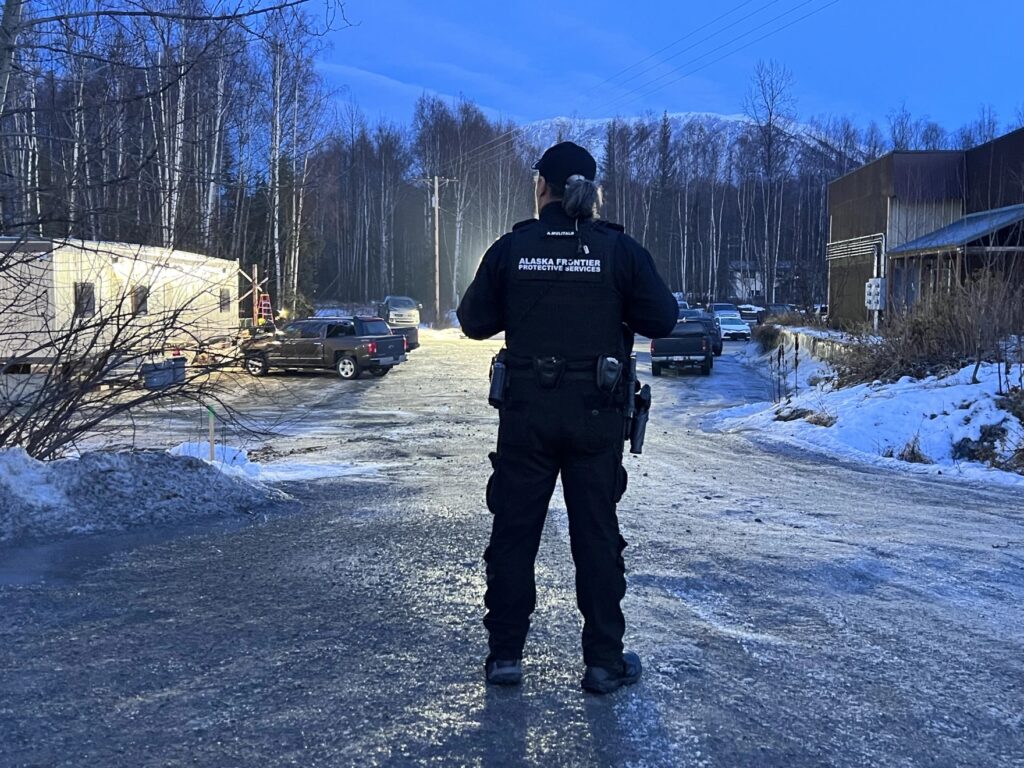Podcast: Play in new window | Download | Embed
Photo: Security guard stands at entrance of the new Chin’nan Gaming Hall, which opened on Monday in Birchwood, Alaska. (Rhonda McBride)
The Anchorage, Alaska area has its first small-scale casino.
The Eklutna Tribe began operations on Monday night in a building in Birchwood.
As Rhonda McBride from our flagship station KNBA reports, it was constructed in less than a week.
The whirlwind effort to get the tribe’s gaming hall up and running is in sharp contrast to the decades it has spent fighting for the legal right to operate it.
So why the hurry?
Did the timing have anything to do with a new president?
While President Donald Trump celebrated his inauguration, you could hear the steady roar of machinery at the tribe’s casino.
Construction equipment raced around a five-piece modular building, bolted together and propped up on wooden blocks.
Even so, the Chin’nan Gaming Hall opened early that evening – and Dan Amadon was the very first to feed money into a gaming machine.
“You put a little in, you get a little out. That’s the fun of it.”
Amadon operates a shop next door and is a supporter, and although this patch of land outside Anchorage still seems more like a construction zone, Aaron Leggett, president of the Native Village Eklutna, called the first day of operations a “historic milestone” for the tribe.
The building sits on a Native allotment that a year ago did not have the necessary Indian Country status for gambling.
But last year, the tribe got final approval from Bryan Newland, the outgoing assistant secretary of Interior just five days before the Trump administration takeover.
Don Mitchell, the lawyer for property owners who have sued the tribe, believes the scramble to open was to head-off the Governor of Alaska’s request to President Trump to block the casino.
“They somehow think that by opening a symbolic casino – that that will improve their legal position in both the lawsuit and in their future dealings with the Trump administration.”
The tribe says it wasn’t so much fear of Trump but fear of more delays caused by turnover in administrations.
It says once in full operation, its small-scale casino will be an economic lifeline for its tribal members.

ICE agents make an arrest in Scottsdale, Ariz. in 2012 during the Obama administration, which still holds the record for most deportations. (Public domain)
Tribal leaders in the Southwest are addressing concerns from their tribal members as the Trump administration rolls out immigration orders, which include deportation plans.
The Navajo Nation, located in the Four Corners region, and the Mescalero Apache Tribe in New Mexico say they’ve received concerns this week about circulating stories of tribal members being approached by U.S. Immigration and Custom Enforcement (ICE) Agents in urban areas.
The Navajo Nation Council on Thursday urged Navajo Nation President Buu Nygren to take immediate actions on what it said are “raids in Arizona, New Mexico, and Utah.”
The council says it’s sparking fear.
President Nygren says, as of Thursday night, there were “no confirmed cases of detentions” of Navajo citizens, but he’s asking Navajo people to stayed informed, remain calm, and to carry a state-issued identification card.
In a letter Thursday, to Mescalero Apache tribal members, the tribe stated it verified one incident where an ICE agent questioned a tribal member in the village of Ruidoso.
Mescalero Apache President Thora Walsh-Padilla addressed concerns in a social media video message to tribal members asking them to report any encounters.
“We are very, very worried about out tribal members at this time that such things could happen at this day and age. We are doing everything we can and remember that we are the Indigenous people of this area and we are also a sovereign nation and we do have rights. So, please let us know as soon as possible if you have some sort of encounter with ICE agents.”
President Walsh-Padilla says the tribe is working with New Mexico’s congressional delegation and has posted information on its website for tribal members about how to respond if confronted by ICE agents.
Get National Native News delivered to your inbox daily. Sign up for our daily newsletter today.



